![]()
A Little Touch of Schmilsson in the Night
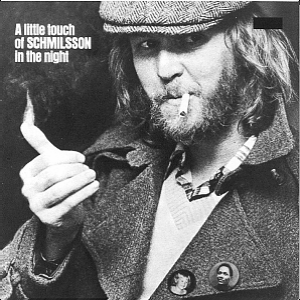
![]()
"What a voice! Beats the s**t out of Sinatra"
A quotation Harry claimed Gordon Jenkins made to him after working on this album.
(Jenkins was the music behind Sinatra)
Following the commercial success of his previous two ‘Schmilsson’ albums it would, perhaps, have been an unexpected step (especially for Nilsson’s fans) if he had continued to produce albums in the same vein. For a start the ‘See you next album Richard’ we heard at the end of ‘Son Of…’ was never going to happen. Richard Perry has said on many occasions since that he was very disappointed with how the second album had turned out and had decided he would NOT produce Harry again. Also, Nilsson was far too unpredictable to find a groove and stay in it for the rest of his career…he could not even maintain a style right through an album (The Point would be nearest, I guess…). I think it was his vaudeville roots that helped to evolve Harry the Variety act; the previous review lists the number of different genres found on just one album but going right back to Pandemonium we can see this trait clearly – there is rock, ballad, pastiche, cover versions and an old time Music Hall song.
So Harry, with two Grammys behind him and a good reputation (just, at this stage, slightly tarnished by an ever-growing consumption of alcohol and drugs and some of the more arcane lyrical contributions on his last album) in the pop industry made such a change in career direction he surprised everyone. These days there is nothing unusual about artists covering ‘standards’ from a different era. I can think of Bryan Ferry, Rod Stewart and even Robbie Williams who have done so since – but no-one had done it before Harry. For his next LP Harry gave us a beautiful, lushly orchestrated songbook featuring not his own compositions but ones by eminent names from the past including Irving Berlin and Gus Kahn.
The orchestrations were made by Gordon Jenkins (who also wrote one of the songs) and they are as much a feature of the record as Harry’s superb voice. The choice of Jenkins was, like the whole idea behind the album was Harry’s long-time friend, liner-notes writer and ex-Beatles publicist Derek Taylor and Derek produced it himself - something he had never done before. According to Derek – they did it because the songs deserved it! Harry gave Taylor his full support and they collaborated in choosing the songs. Jenkins had worked with some of the greatest names in recorded music history: Judy Garland, Al Jolson, Danny Kaye and Sinatra to name just a few. Derek persuaded Harry by taking him round London record shops playing him some Gordon Jenkins arrangements in the listening booths – and Harry was convinced. Once Gordon had heard Harry's voice (Derek sent LPs to California!) he became as keen to make the album as the other two were - with the exception being his downright refusal to work on 'Auld Lang Syne'!
The album title is a play on words taken from Shakespeare's 'Henry V' -
"His liberal eye doth give to every one,
Thawing cold fear, that mean and gentle all,
Behold, as may unworthiness define,
A little touch of Harry in the night."
The album was recorded in four days in March 1973. It was recorded live - instrumentalists and singer without overdubs, just as nature intended. Jenkins used excerpts of other songs in the intros to others - more of which later - and the orchestrations contain so much humour, pathos and detail it is hard not to hear new things even decades after first hearing them. Those intros...I wondered for years why I heard 'Over the Rainbow' in one when it wasn't on the album??? It turned out that they finished recording early and rather than just throw away the extra already-booked studio time all participants agreed they were having such fun they wanted to do more. So 6 more songs were recorded - including 'Over the Rainbow'. A few days later the same musicians assembled again and re-recorded the music in front of the cameras for the BBC.
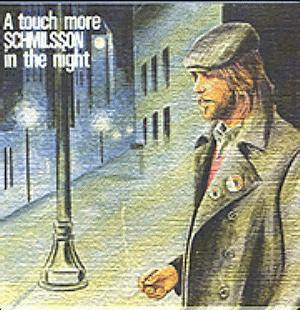 The
extra 6 songs remained unreleased until the 1980s when Harry's friend Rob Burt(1)
manoeuvred the release of 'A Touch More Schmilsson in the Night' from the master
tapes he found "lying in Guildford". This release included the
afore-mentioned sextet of unreleased songs, along with some alternate versions
of some from the original album plus 2 tracks from 'Knnillssonn' (I never really
understood why!)
The
extra 6 songs remained unreleased until the 1980s when Harry's friend Rob Burt(1)
manoeuvred the release of 'A Touch More Schmilsson in the Night' from the master
tapes he found "lying in Guildford". This release included the
afore-mentioned sextet of unreleased songs, along with some alternate versions
of some from the original album plus 2 tracks from 'Knnillssonn' (I never really
understood why!)
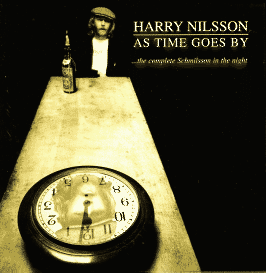 Then, in
the 1990s, all the songs were released on a single CD 'As Time Goes By' - again
a Rob Burt project.
Then, in
the 1990s, all the songs were released on a single CD 'As Time Goes By' - again
a Rob Burt project.
Perhaps the album's best accolade came from Gordon Jenkins himself who remarked after its completion that none of the songs it contained had, in his opinion, ever had a better reading.
The album's artwork featured all the instrumentalists in pictures and 'the girl in the heart' as Kathy Simmonds later introduced herself to those of us on Nilssonweb; she was Harry's girlfriend at the time - and who could question his taste! She was gorgeous...and I had a blow-up of her picture on my bedroom wall as teenager!
*I got to know Rob early in 2001 while
co-organizing Harryfest 2001 (London). He was
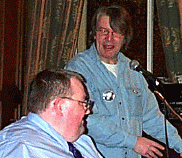 our special guest for the
Banquet and he spoke to me on the phone several times from his home near
Swansea. he admitted to me he was not well but was very keen to attend the
event, which he did with his son, coming up to London on the train. We had
all eaten very well and I had performed, with my pianist Alvin, a selection of
Nilsson favourites and, finally, Rob rose to speak, telling us great stories
about his adventures in swinging London with Harry and George Harrison.
Tragically, at the end of his talk Rob collapsed into my arms having suffered what turned out to be a
fatal heart attack. He went the same way as his hero Harry, at least and
we know just how much he wanted to be there with us that evening.
He had planned to auction off some memorabilia that night including a signed
copy of The Point and the original artwork for the 'A Touch More...' album
(above, left). Of course,
that did not happen but a donation was made from the Harryfest delegates and
sent to the British heart Foundation in memory of both Rob and Harry.
our special guest for the
Banquet and he spoke to me on the phone several times from his home near
Swansea. he admitted to me he was not well but was very keen to attend the
event, which he did with his son, coming up to London on the train. We had
all eaten very well and I had performed, with my pianist Alvin, a selection of
Nilsson favourites and, finally, Rob rose to speak, telling us great stories
about his adventures in swinging London with Harry and George Harrison.
Tragically, at the end of his talk Rob collapsed into my arms having suffered what turned out to be a
fatal heart attack. He went the same way as his hero Harry, at least and
we know just how much he wanted to be there with us that evening.
He had planned to auction off some memorabilia that night including a signed
copy of The Point and the original artwork for the 'A Touch More...' album
(above, left). Of course,
that did not happen but a donation was made from the Harryfest delegates and
sent to the British heart Foundation in memory of both Rob and Harry.
Here is a copy of the letter sent to Harryfest from the British Heart Foundation:
Dear Mrs Murphy, Thankyou for your kind gift in memory of Rob and Harry from Harryfest 2001. Kindly pass on my thanks to all those who contributed. We at the British Heart Foundation find it such a tragedy that heart disease still takes so many lives. We are committed to doing all we can to help make heart disease a thing of the past, which is why BHF is the major independant provider of funds for heart research, patient care and public education in the UK. Of course, this would not be possible without the thoughtful generosity of people like yourself (cut). Yours sincerely, Brenda Mole (in memoriam co-ordinator)
To donate to the BHF visit their website at www.bhf.org.uk
For the purpose of the review I will use 'As Time Goes By'
Lazy Moon
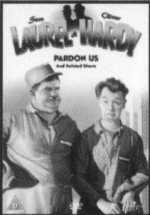 Harry was well-known for being a Laurel &
Hardy fan - his performance as a Tower-Guard in the movie 'Skidoo' was obviously
inspired by Stan Laurel and he gives us another clue with the thumb/cigarette
lighter gag reproduced on the front of the original 'A Little Touch' LP.
He also appears "with" Oliver Hardy in the video for 'Loneliness' - one of the
songs of Yoko Ono's he recorded in the early 1980s.
Harry was well-known for being a Laurel &
Hardy fan - his performance as a Tower-Guard in the movie 'Skidoo' was obviously
inspired by Stan Laurel and he gives us another clue with the thumb/cigarette
lighter gag reproduced on the front of the original 'A Little Touch' LP.
He also appears "with" Oliver Hardy in the video for 'Loneliness' - one of the
songs of Yoko Ono's he recorded in the early 1980s.
Lazy Moon was composed by Bob Cole and J Rosamond Johnson way back in 1901. Cole was best known for writing the being the first black composer to write an entire musical and have it performed off-Broadway by an all-black cast ('A Trip to Coontown' 1898). However, Lazy Moon does not seem to have been, at the time anyway, one of his more successful compositions. At the time ALTOSITN was recorded his publishers had no record of the song ever having been recorded. This was obviously an error in their records as Harry had become familiar with the song through the 1931 Laurel & Hardy film 'Pardon Us' in which it is sung by Oliver Hardy.
The album is topped and tailed with little spoken out-takes from the sessions; the first is just a bit of studio chat: 'take as much time as you like', before Harry launches into the opening lines of 'As Time Goes By' to set the scene for the album to come:
You must remember this,
A kiss is still a kiss,
A sigh is just a sigh,
The fundamental things apply...
at which point Jenkins' strings soar into the first of his beautiful interludes. A diminuendo leads directly to the quiet, pizzicato introduction to 'Lazy Moon'. Immediately noticeable is the way Nilsson is close-miked on this album giving an intimacy to his vocals. It is a brave move for a singer to take this approach. You hear every breath, every flick of the tongue or lips. Often, singers who want to place the microphone so close decide to double-track their voice in order to give themselves more leeway - Harry's vocal performances on this album are so good, however, he never needed such an escape route. His delivery is languid, laid-back and entirely accurate. Long portamento slides between notes are delivered seemingly effortlessly and he is even able to gauge the amount of air 'escaping' with the note - adding more of the effect wherever he wants it (e.g. on the final 'La-----zyeeee Moooooon')
For Me and My Gal
The intro to this classic old chestnut tips a wink to a song we will hear later ('This is All I Ask') - a feature that, again, runs through the album. Many artists have recorded this song, among them Maurice Chevalier and Judy Garland (from the 1942 musical that marked Gene Kelly's screen debut). The composers were George W Meyer - a self-made Tin Pan Alley legend, Edgar Leslie - a lyricist and one of the founders of ASCAP and E Ray Goetz - who worked with many composers including his brother-in-law Irving Berlin.
Jenkins employs a 'call and response' orchestration throughout this arrangement, each line of sung melody followed by an instrumental passage to balance the phrasing. This becomes less noticeable as the song progresses until both singer and orchestra join forces towards the end. At this point Jenkins orchestrates rather like Glenn Miller, with the string harmonies closely packed within an octave. The guitar features nicely in the orchestration as well and the sparing but effective use of the harp is beautiful.
It Had to be You
Another very well-known (and oft-recorded) song, this time written by Isham Jones/Gus Kahn in 1924. The song featured in the Bogart classic movie 'Casablanca' (along with another song on this album, of course) and had already been recorded by Barbara Streisand, Doris Day, Louis Armstrong and Ella Fitzgerald. The same pair of composers also wrote the music for the popular song 'I'll See You In My Dreams' while Kahn was lyricist for 'Makin' Whoopee' which was to be the next but one song on this album.
This has a very similar arrangement to its predecessor in many ways - most notably the guitar work by Judd Proctor which permeates the sound throughout - but also with the same call and response featuring prominently.
Kahn provided two alternate sets of lyrics for the song. Harry (inevitably?) chose the 'joke' version for his reading of it, finishing with the lines:
I'm five foot ten - a man among men
And you're seven - two!
But with all your faults it's you I adore;
When you stand up your hands touch the floor!
It had to be me - unlucky me -
It had to be me.
Now this is the point where I have a little problem with the concept of the original album not intending to include 'Over the Rainbow'. The outro to 'It Had to be You' and, consequently, the link to the next song 'Always' both quote directly from 'Over the Rainbow' (the latter song also repays the compliment to 'It Had To Be You'). All the other links between songs (bar one) quote, if they quote at all, from other songs included in the line-up. So, if 'Over the Rainbow' was one of the 6 additional songs recorded during the 'spare' studio time why did Jenkins weave the song into the fabric of the whole album's construction? Until 'A Touch More...' was released in 1988 (along with BBC Radio 2 DJ Terry Wogan's incessant playing of the song in question...I stress it was my parents who told me about it!) I had always thought the 'Rainbow' snippets distinctly out of place. Suddenly everything fitted - but the questions above still need answers and, sadly, neither Harry, Gordon nor Derek are around any more to provide them. (Jenkins died in 1984, aged 73 from Motor Neurone Disease. The biography 'Goodbye' - named after the song he wrote that was used by Benny Goodman as his 'signature tune' - written by his son Bruce was published in 2005 and contains a whole chapter about his work with Harry Nilsson.)
Always
Irving Berlin wrote 'Always' in 1925 for his wife-to-be Ellin McKay - and to prove he meant it he gave her all the song's royalties! This was one of Harry's own choices for the album and he sings it with a clear affection (although he had recently fallen in love again recently himself, of course - with Kathy Simmonds.)
The song is a complex composition wandering through many keys and with a very complicated chord sequence - not easy to arrange, or even to play - but Jenkins still manages to add a touch of his own class here - listen for the descending chromatic flute line near the beginning - absolute perfection!
Harry seems a bit uncertain about how should end this song. On this album version he sings a tidy ornament on the first syllable of the last 'always' but then wanders down to the 7th below and beyond... On the 2nd version (listed below with bonus tracks) he stays firmly in key on the last note. For me that makes it a very slightly better version.
Makin' Whoopee
This must have been a very risqué song in 1926 when it was composed by Walter Donaldson and Gus Kahn! Despite its use of a slang colloquialism there can be no shrouding the fact that this song is about sex - both marital and illicit - and it is also largely anti-marriage (though Harry could, no doubt, relate to that having recently split from his wife Diane - it was only on his next album that he echoed the judge's warning at the end of the song - 'I miss the alimony too.')
Over the years this song has drawn more critical acclaim than the rest of the album and it is widely regarded as a classic recording. It begins with another brilliant Jenkins link - although the first thing you hear is an intro based on thematic material from 'As Time Goes By' Jenkins also refers (in feel if not direct notation) to 'I didn't want to do it' (from 'You Made Me Love You') - clearly here meaning getting married! Other recordings of the song feature sung intros on the same theme. Eddie Cantor sang:
Every time I hear that dear old wedding march
I feel rather glad I have a broken arch.
I have heard a lot of married people talk
And I know that marriage is a long, long walk.
To most people weddings mean romance
But I prefer a picnic or a dance!
Clearly Eddie 'didn't want to do it', either!
Of course 'As Time Goes By' has its own direct reference to the song inasmuch as every marriage breakdown occurs over time. No doubt the bride and groom in question on that sunny afternoon did not intend for their partnership to fracture but the song describes how it does - as time went by. The arrangement is quirky, sparse and funny - making more use of woodwind and French horns than other cuts. The strings 'squirm' as you can imagine the song's protagonist squirming and you can even hear the wife 'nagging' when suspecting him - can't you hear her pointing the finger?. Such word-painting is not found throughout the album but, in this song in particular, it helps deliver the humour. The slapstick even makes it to the courtroom where shrieks of alarm can be heard in clarinet squawks!
With all Gordon's work behind him there was no need for Harry to try to be overtly funny and he only needs deliver a largely deadpan rendition of the song to make it work so well. I'm sure he often had a smile on his face, though!
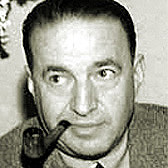 The
tune is very catchy, the words clever - this has all the hallmarks of a great
song and is one of the songs that mark Gus Kahn (in particular) down as one of
the best lyricists of the 20th Century (in addition to the two well-known songs
he wrote on this album he is also famous for 'Dream a Little Dream' (Mamas and
the Papas, amongst many others), 'Yes Sir, that's My Baby;' and 'I'll See You In
My Dreams'. One final point is that to at least one other composer the
tune may have been too memorable - Yoko Ono was sued by this song's
publishers for plagiarism when she wrote 'I'm Your Angel' for 'Double Fantasy'.
(left - Gus Kahn)
The
tune is very catchy, the words clever - this has all the hallmarks of a great
song and is one of the songs that mark Gus Kahn (in particular) down as one of
the best lyricists of the 20th Century (in addition to the two well-known songs
he wrote on this album he is also famous for 'Dream a Little Dream' (Mamas and
the Papas, amongst many others), 'Yes Sir, that's My Baby;' and 'I'll See You In
My Dreams'. One final point is that to at least one other composer the
tune may have been too memorable - Yoko Ono was sued by this song's
publishers for plagiarism when she wrote 'I'm Your Angel' for 'Double Fantasy'.
(left - Gus Kahn)
You Made Me Love You
Another very old song. this one - dating from 1913 but well-established in the public consciousness through numerous recordings and its memorable use (though with alternate lyrics) in the 1937 musical 'Broadway Melody of 1938' starring Judy Garland and Clark Gable.
This is another of the songs for which we have an alternate recording thanks to the 1988 release and there are numerous differences both in Harry's vocal performance and also in the orchestration between the two. Although the remixing done of the 2nd version brings out more of the instrumental detail there is no doubt that Harry's vocal on the former is the better one.
Lullaby In Ragtime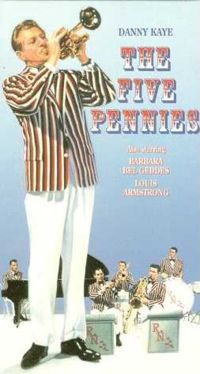
This was always one of my favourite songs on the album but it meant even more to me when I discovered the film 'The Five Pennies'. Being something of a Danny Kaye fan I watched the film with my eldest son (now nearly 16) when he was about four years old. He loved it too and, having recorded it on VHS, it was watched over and over again over the next couple of years. The film tells the story (it is only semi-biographical) of jazz cornettist Red Nichols (whose band was called 'The Five Pennies'). In it features this song - not a Red Nichols original but actually penned by Danny Kaye's wife Sylvia Fine for the movie. It was even nominated for the Best Original Song Oscar. It is a very clever composition as it was written to complement the title song of the film. The two songs can be sung at the same time and fit beautifully - but not only that, the two can also be sung at the same time as 'The Battle Hymn of the Republic' as seen in the film where Kaye performs it with his screen daughter and jazz legend Louis Armstrong, singing a song each!
Yet 'Lullaby' stands out on its own as a song as well - with ease - and, slowed down, as it is here (Jenkins arranged it 'on site' during the sessions) it makes for a wonderful recording and Nilsson's own original album cover mooted it as a single (which never happened). It received a lot of airplay in the UK in the 1990's when it was used for a series of car advertisements on TV. In these days where downloads count towards chart positions it may even have provided Harry with a posthumous, surprise hit.
It is a very gentle, laid back and relaxed song but it still makes the bass cones in my car's speakers nearly jump out of their housings. Guitarist Judd Proctor is very much a major contributor to this performance and his relaxed, leisurely picking is a real highlight. (Proctor was a well-known session musician who also wrote music for TV and film, including the 1969 BBC TV series 'Thicker Than Water') But there is so much more in Jenkins' arrangement as well (hear the oboe trill on 'as still as the trill of a thrush') making this a real stand-out.
And...of course...it goes without saying Harry sings brilliantly!
I Wonder Who's Kissing Her Now
This is probably the oldest song on the record, dating from a musical show 'The Prince of Tonight' (1909) and composed by Harold Orlob. The song has some legal background, though - for it was customary that long ago for copyright of the song to be given to the publisher - one Joseph Howard in this case. But, for many years, Howard claimed to be the sole composer and it was only when a biopic of Howard's life - going by the same name as the song - was made in 1947 that Orlob sued to have himself declared the song's true composer. The case was settled out of court, Orlob receiving no financial recompense and a half-share in the writing credits.
Jenkins returns to the theme of 'break-up' once more for another clever intro here - he opens the song with a grandiose reminder that 'the bells are ringing for me and my gal' - only to immediately follow it with a doubtful transition into 'I wonder who's kissing her now' - reflections of the 'Makin' Whoopee' story surfacing again.
Harry only records the song's chorus here, there being at least two verses with a much less inspiring melody. In fact it is only slowing the waltz-like original down that gives the song much of its emotional and romantic impact. Harry's almost lethargic vocal sends one even further down a dreamy-eyed memory lane. The solo violin maybe takes the pathos a tad too far down the Victorian melodrama route but is easily excused - we love it really!
What'll I Do?
This Irving Berlin number from 1924 is, probably, the most recorded song of all those on the album (the possible exception being 'As Time Goes By'). The liner notes on the original release intimates that Berlin would be sent a copy of the recording - I'd love to know what he thought! (Berlin, of course, lived past his 101st birthday - dying in 1989.)
Harry begins with the rarely heard verse (many of Berlin's songs are only known by their choruses - most notably 'White Christmas' - how many have ever heard the verse to that?) The gentle waltz rhythm provided by the guitar, bass and harp provides a backdrop for the rest of Jenkins's orchestration once more - there is always so much to hear in these if you can (sacrilege!) ignore Harry's singing for a while - there is humour, such clever chord changes, wonderful counter-melodies (listen to the soaring string tune at 1'20" for an example).
...And Harry takes us on another wistfully romantic musical journey - once again his breath control is staggering on this song - he sings line after line without a break - finally sounding like he is fading a note out to take a breath only to crescendo once more into the next phrase! For me one of the best songs on an album where they are all wonderful.
Nevertheless
Here, for the second time on the album the instrumental introduction refers to one of the songs recorded during the sessions but missing from the original album - in this case 'I'm Always Chasing Rainbows', played beautifully in the high register by the bassoon
The song dates from 1931 and was originally a hit for Bing Crosby - although later it was also a success for Frank Sinatra and many others. Harry Ruby was a prolific composer and he had a long and successful writing partnership with lyricist Bert Kalmar. Ruby wrote the music for many of the Marx Brothers films and for some of them he also wrote the screenplay! The story of the partnership is told in the 1950 MGM film 'Three Little Words' starring Fred Astaire and Red Skelton.
At times, in another master-class of vocal flexibility, Harry sounds much younger here. The timbre of his voice and the fresh sounding, high tenor range (not including the one falsetto note) he employs are very reminiscent of his early recordings, back as far as the Scott Turner demos.
This Is All I Ask
This song was composed by Jenkins himself and had previously been recorded by Frank Sinatra and, more recently by Tiny Tim, the American singer/ukulele player who was most notable for singing in falsetto and with a heavy, distinctive vibrato. Coincidentally, Tiny Tim's version was produced by Richard Perry.
This time the link/introduction is based on 'Always'. Harry then sings the verse in his lazy, relaxed mode before the main part/chorus of the song lilts in gentle rhythm. The words 'Beautiful girls, walk a little slower when you walk by me' were inspired by graffiti on a wall. This is not an easy song to sing, particularly in the middle section (take me to that strange, enchanted land) where there are some difficult modulations and chromatic lines - the nearest Harry got to being beaten on the whole album - yet he redeems any doubts with his spectacular display of vocal gymnastics near the end! (According to 'Goodbye' this note cost RCA in the region of $20,000! It was the one thing Harry was unhappy with when he listened to the playback - a session was booked in RCA studios New York and Harry, Derek Taylor, Phil McDonald et al flew to NY for the weekend to make the edit. It was not the studio but the drinking bill that cost all the money!)
 I'm
Always Chasing Rainbows
I'm
Always Chasing Rainbows
This is the first of the 'additional tracks' that remained unreleased until 'A Touch More...' was released in 1988. The song dates from 1918 and Harry Carroll's melody is based on Chopin's 'Fantasie Impromptu'. Carroll also wrote 'The Trail Of The Lonesome Pine' - no doubt of interest to Harry as it was famously sung by Oliver Hardy (again!) in 'Way Out West'.
While Harry's performances on this and the next four 'originally unreleased' songs is pleasant and well worth the listening I must admit to finding them a little less remarkable than the almost impeccable standard he sets on the rest of the album - perhaps a reflection on the relative lack of preparation time?
Another version of the song was recorded by Nilsson's good friend and drinking buddy Alice Cooper as a finale to his 'Alice Cooper Goes to Hell' album three years later.
Make Believe
Another arrangement in the 'Lullaby In Ragtime' mode - I consider them sisters on the album. The song is from the extremely successful Jerome/Kern/Oscar Hammerstein musical 'Show Boat' (1927). Gordon Jenkins was reported to have sat and made the extra arrangements 'on site' but I suspect most of them of being older arrangements that he may well have adapted for the forces he had here - for one thing neither this nor the next three songs contain quotations from any others on the album during their introductions - making them different from the others in this collection in that, most important respect (and reinforcing my belief that 'Over the Rainbow' and 'I'm Always Chasing Rainbows' may have been left off the original album for some other, unexplained, reason).
Trust In Me
Rather surprisingly this was the second Milton Ager song recorded by Harry - the first having been 'Freckles' back on Pandemonium Shadow Show! (John Lennon also sang an Ager composition in the early days of The Beatles and 'Aint She Sweet' was even recorded during the Hamburg sessions with Tony Sheridan).
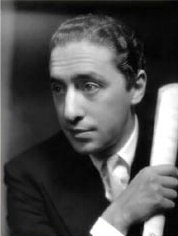 It's Only A Paper Moon
It's Only A Paper Moon
Originally titled 'If You Believed in Me' when composed for 'The Great Magoo' its name was changed in 1933 when used in the film 'Take A Chance' this is the first of two Harold Arlen (pictured, right) songs on the album. Arlen wrote over 400 songs including 'Stormy Weather, Get Happy and, of course, most of the rest of 'The Wizard of Oz'.
Thanks For the Memory
This song was Bob Hope's signature tune. Composed by Leo Robin and Ralph Rainger he first sang it in the movie 'The Big Broadcast of 1938', it won an Oscar for Best Original Song and Hope continued to sign off with it for the rest of his career.
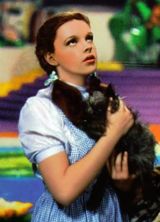 Over The Rainbow
Over The Rainbow
What else can be said about this song? It
was voted the greatest song of the 20th Century by the Recording Industry
Association of America. Of course it won the Academy Award for Best
Original Song. It is probably one of only a small handful of songs that
virtually everybody in the Western World would be guaranteed to know. It
has probably been recorded hundreds of times - and performed by countless
thousands of different singers - but have any of them done a better job than
Harry Nilsson here? Purists might argue that none could have bettered Judy
Garland's original - others might point to the incredibly talented and
tragically short-lived Eva Cassidy whose performance of the song was also
superb. But for me - Harry wins hands-down!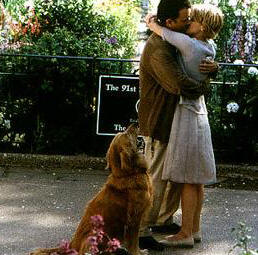
His laid-back, indulgent vocal is the aural equivalent of his beloved Brandy Alexanders - soft and velvet, creamy and luscious, dripping into the senses waves of pure delight; shooting tingles down the spine and heightening the emotions. Harry caresses the vowels, delicately places each consonant and glides from note to note with the grace of a soaring eagle riding the air-streams.
Behind him Jenkins treats the song with due deference - beginning with a quote from 'It Had to Be You' and, once the song begins employing those endearing counter-melodies - their own meandering chromaticism both emphasising and complimenting Harry's own slurring delivery. Add the word-painting (hear the flutes imitate 'birds fly') and the perfect timing that evolved during Gordon and Harry's partnership* and this recording is pretty darned close to that perfection every artists search for and so few manage to find.
This version rose to more prominence when used for the climax of the Tom Hanks/Meg Ryan film 'You've Got Mail' in 1998 (one of four Nilsson recordings to find a home there). In the film it is married to the instrumental link/intro to 'Always' (quite fitting in a stand-alone version) and complete with the additional whistling as heard on the 'outtake' version on 'A Touch More...'. The song marks the final 'actual' meeting of the pair (who have previously shared only an email relationship) and the mixture of fulfilment, longing and relief of that moment makes a uxorious marriage with the song.(2)
As Time Goes By
From the opening cello solo reminding us of 'I Wonder Who's Kissing Her Now' this recording must be one of the most familiar to many Nilsson fans. - and the song one of the most well-known pre-WWII songs in most peoples' minds.
The song came to prominence when used so memorably in the 1942 classic movie 'Casablanca' (sung by Dooley Wilson - and, of course, neither Bergman nor Bogart actually said 'Play it Again, Sam'). It had been originally written in 1931 by Herman Hupfeld for the musical 'Everybody's Welcome' and it proved a popular hit for, amongst others Rudy Vallee. After 'Casablanca' however the song was forever linked with Warner Brothers and the tune is still used over sixty years later in promotional material for Warners. Hupfeld is barely remembered for anything else he wrote although his 'Sing Something Simple' provided the signature tune for a BBC radio series featuring the Cliff Adams singers which ran for an incredible 42 years from 1959 through to 2001 when Adams died.
This was always intended to be the final song on the album - tying up the package neatly as it had opened it too - and it provides a fitting end to a delightful hour in the company of messrs Nilsson and Jenkins.
As the final chord reverberates around the studio one wishes for nothing more than a silence in which to contemplate and reflect on what we have heard. I have a feeling that harry would very much approved of Rob Burt's decision to shatter the tranquillity by giving us Harry's request to 'Chris' (Chrissie Hayes, production assistant) to give him 'some scotch, some water, some matches and some heroin please...no order'
On 'A Touch More Schmilsson in the Night' there are additional versions of 'Always', 'It Had to be You' (with the 'straight' lyrics), 'Lullaby in Ragtime' and 'You Made Me Love You'.
While there are differences between these versions and the 'originals' they are often small although the mixes bring out different instruments from the orchestra. Any major changes are outlined above. The four songs only found on the 1988 release do give it something of a rarity value, though and, at the time of writing, the only one on offer at amazon.com is selling for 50 dollars!
(1) This relationship is again referred to in Bruce Jenkins's book. Harry was rather non-plussed to find that Gordon was prepared to 'wait for him' at the end of songs and, once Jenkins had reassured him that he was 'paid a lot of money to wait' Harry relaxed into and enjoyed the recordings much more.
(2) Something I find very interesting about the Meg Ryan/Tom Hanks/Nora Ephron use of Nilsson songs is that none were used in their previous collaboration 'Sleepless In Seattle'. In fact, in that movie a much, much inferior (and definitely 'out of place') version of As Time Goes By, recorded by Jimmy 'Schnozzola' Durante is used and I can not watch the film without thinking how much better Harry's version would have been in its place.